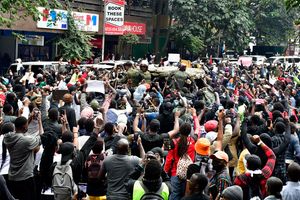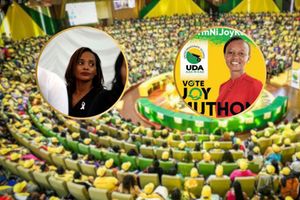
Kalonzo Musyoka and Former President Uhuru Kenyatta are already jostling for position and public appeal, signalling an intense and strategically nuanced run-up to the 2027 elections.
Former President Uhuru Kenyatta has reclaimed ownership of Jubilee Party as Wiper Democratic Movement of Kalonzo Musyoka officially rebranded to Wiper Patriotic Front in preparations for 2027 contest.
In a gazette notice, Office of the Registrar of Political Parties (ORPP) confirmed Mr Kenyatta as the Jubilee Party Leader, his allies Jeremiah Kioni and David Murathe as Secretary-General and Deputy National Chairman, respectively.
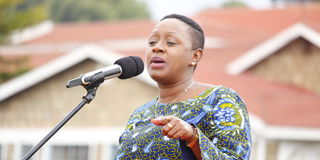
Jubilee nominated MP Sabina Chege. She attributed her success to Pastor Ng'ang'a of Neno Evangelism Centre.
The ousted faction
The notice has dismissed nominated MP Sabina Chege and East African Legislative Assembly (EALA) MP Kanini Kega, who had declared themselves as Party Leader and Secretary General, in an attempted coup against Mr Kenyatta.
Ms Chege and Mr Kega tried to take over the party after declaring support for President William Ruto’s administration.
Other allies of Mr Kenyatta, who were picked to various positions during the party’s National Delegates Convention (NDC) that was convened by the former President on May 22, 2023, have also been confirmed as the bonafide party officials.
They include Saitoti Torome, who is now the official national chairman after replacing Nelson Dzuya, Beatrice Gambo, who has replaced Jimmy Angwenyi as deputy party leader in charge of strategy and Yasin Noor, who has officially taken over as the deputy secretary general, replacing Joshua Kutuny.
Mr Kioni described the notice as a major win for the party as it provides clarity on the party leadership. He said the coup plotters would have to win the trust of the party members before they can be embraced back.
“Those who plotted the coup have a lot to do to win back the trust of the party members. They have to reconcile with the members,” said Mr Kioni.
“The most important thing for us at this time is that there is now clarity on who the party officials are. This notice settles the confusion that has been there in the party.”
Mr Kenyatta’s camp has since declared support for former Interior Cabinet Secretary Fred Matiang’i’s presidential bid on the Jubilee ticket.
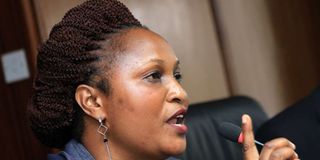
The Registrar of Political Parties Anne Nderitu.
Wiper's youthful rebrand
In another gazette notice by Registrar of Parties Anne Nderitu, Wiper Democratic Movement has formally changed its name in an attempt to appeal to the Gen Zs, who have become an attractive voting bloc for key political players.
“In exercise of the power conferred by section 20(1)(d) of the Political Parties Act, the Registrar of Political Parties gives notice that Wiper Democratic Movement (WDM) intends to change its name to Wiper Patriotic Front (WPF),” states the June 18, 2025, gazette notice.
Mr Musyoka, while speaking in Ukambani last Friday, said the rebranding was inspired by the desire to identify with the youth.
Born between the late 1990s and 2010, this cohort of young Kenyans is emerging not just as a voting bloc but as a cultural and political movement.
The rebranding is meant to shed the tag of being an ‘Ukambani’ party and appeal to a wider support base ahead of the 2027 contest.
Wiper was formed after Mr Musyoka’s fall-out with veteran politician Raila Odinga in 2007 in a battle for the Orange that led to ODM and ODM-Kenya featuring in the elections.
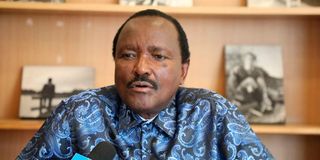
Wiper Democratic Movement leader Kalonzo Musyoka.
Mr Musyoka’s ODM-K would later rebrand to Wiper Democratic Party-Kenya, while Mr Odinga has retained ODM.
Since his last stab at the top seat in 2007, Mr Musyoka has not sought the high office, but has backed Mr Odinga twice - both instances as his running mate and in 2022 as designated Prime Cabinet Secretary.
The rebranding by Wiper comes even as more political parties get registered in a new mad rush ahead of 2027.
ORPP has in the last couple of weeks issued provisional registration to an additional seven political parties, on top of seven others enlisted in the month of May.
The new parties include Party of Action (POA), The Economic Pillars Alliance (TEPA), Achievement Party of Kenya (ACPOK) and Mkenya Daima Party (MKDP). Others are Economic Patriotic Alliance (EPA), Accountability and Transparency Party (ATP) and Kenya Liberation Movement (KELMO)
POA has listed Samuel Macharia, Juma Hemedi, Riziki Ahmed, Lilian Njogu, Sanju Kajwang and Geoffrey Githae as its founder members, while TEPA has Julius Karanja, Joseph Mwangi, Bennitah Kisongora and Celine Marongo as its founders.
ACPOK has Protas Nyongesa, Joyce Mwangi and Wilfred Kimathi as its founder members, with MKDP having John Thuo, Rose Mwalili and Julius Mghang.
Read: Uhuru's Jubilee versus Rigathi's DCP: Which way Mt Kenya?
In the month of May, a total of seven new political parties received provisional registration, while another five were in the process of obtaining full registration.
Those provisionally registered in May included Peoples Forum for Rebuilding Democracy (PFRD), Imarisha Uchumi Party (IUP), African Development Congress (ADC) and Kenya Ahadi Party (KAP) in the month of March.
Others were the National Economic Development Party (NEDP), Forum for Economic Development Agenda (FEDA) and Kenya United Generation Party (KUG).
Exchequer disbursements running into billions of shillings for political parties and the desire to enter a coalition as a principal have been linked to the mad rush to register new political parties.
Some individuals, who may not be interested in running for political offices, are also in the latest craze to enlist new outfits with plans of selling them in the run-up to the 2027 General Elections.
Some top political leaders have also in the past ended up partyless after rival factions took off with party certificates. Some of these incidents have forced ambitious politicians to have their own political party to secure their election tickets and for purposes of negotiating for coalitions.
The Money Factor
The billions of shillings for political parties have also made running a political party a lucrative business. At least 48 political parties that participated in the 2022 elections are benefiting from the billions of taxpayers’ money to run their affairs.
Dozens of parties that had never benefited from millions of shillings disbursed by the exchequer have, for the first time, after the 2022 elections, received the monies. This was after the changes to the Political Parties Act.
The Act provides that 70 per cent of the money be distributed proportionately, based on the total number of votes secured by a political party in the preceding election.
Another 15 per cent is to be distributed proportionately to parties based on the number of candidates from special interest groups elected in the preceding General Election.
Ten per cent shall be shared out proportionately to parties, based on the number of representatives from the party elected in the preceding General Election, while the remaining five per cent is for administration expenses by the ORPP.
The provision implies that any political party that participates in a General Election stands to benefit from the funds, based on the number of votes attributed to its candidates, even if a majority of them lose at the ballot.
The country currently has a total of 90 fully registered parties. Out of these, only 48 parties actively participated in the 2022 General Election, according to the ORPP Gazette notice on allocation of the Political Parties Fund.
[email protected]


